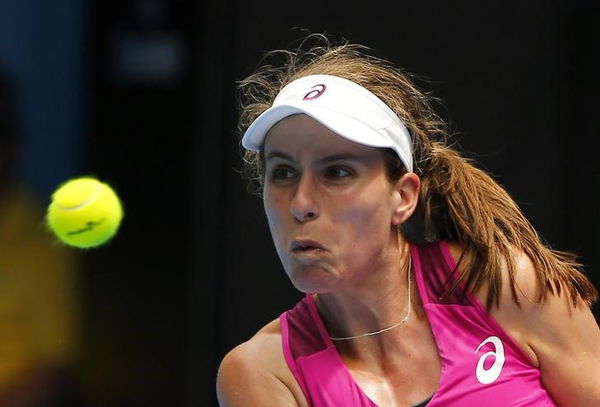
via Reuters
Britain’s Johanna Konta watches the ball during her first round match against Venus Williams of the U.S. at the Australian Open tennis tournament at Melbourne Park, Australia, January 19, 2016. REUTERS/Thomas Peter

via Reuters
Britain’s Johanna Konta watches the ball during her first round match against Venus Williams of the U.S. at the Australian Open tennis tournament at Melbourne Park, Australia, January 19, 2016. REUTERS/Thomas Peter
MELBOURNE (Reuters) – Johanna Konta did not have to wait long after her stunning first round upset of Venus Williams at the Australian Open on Tuesday before having to field the inevitable questions about her national allegiance.
Born and raised until her early teens in Sydney, the 24-year-old world number 47 moved to Britain in 2005 and plays under the flag of her adopted home.
That background was not about to escape the attention of the local media, particularly after the impressive nature of her 6-4 6-2 win over the seven-times grand slam champion and former world number one.
ADVERTISEMENT
Article continues below this ad
Asked whether she might consider switching her allegiance back to Australia, Konta was blunt.
“No,” she said. “Unfortunately, my home is Great Britain. It has been for a long time now, over a decade. Yeah, no, that’s where my heart is.
“Ah, jealousy is not a good thing,” she grinned, as the questioner pursued the point by contrasting her victory with former U.S. Open champion Sam Stosur’s first round exit.
“I think Australian tennis is doing quite well, to be honest.
“You have a number of very good players, and it’s — what’s the word? It’s not a privilege, but it’s a compliment that you guys would say that, so thank you. But be grateful for what you guys have.”
Apart from the local verbal tick of beginning her answers with a “yeah, no”, Konta has gained more obvious benefits from her time in Australia.
“My ability to deal with the heat,” she said. “I think I’m very lucky that I got to spend a lot of my young years here, because I got obviously exposed to the heat out here.”
That was particularly beneficial on Tuesday when temperatures crept towards the 30 degrees Celsius mark on Rod Laver Arena.
ADVERTISEMENT
Article continues below this ad
Because of her nationality switch, Konta is unlikely to be back on the main showcourt for her second round encounter with Carina Witthoeft or Zheng Saisai.
A strong run in the third grand slam of the year might see her grace Centre Court at Wimbledon, however, even if the home of British tennis has less meaning to her than some of her compatriots.
“I didn’t spend my young years there so I didn’t grow up watching Wimbledon. So in that sense I’m a bit of an anomaly,” she said.
ADVERTISEMENT
Article continues below this ad
“Whenever I step out on the court, whether it is at Wimbledon, whether it is here or in Wuhan or in Timbuktu, it really is just about enjoying where I am at that time and regardless of who I’m playing, to really knuckle down and take care of things on my end.”
(By Nick Mulvenney, Editing by John O’Brien)

